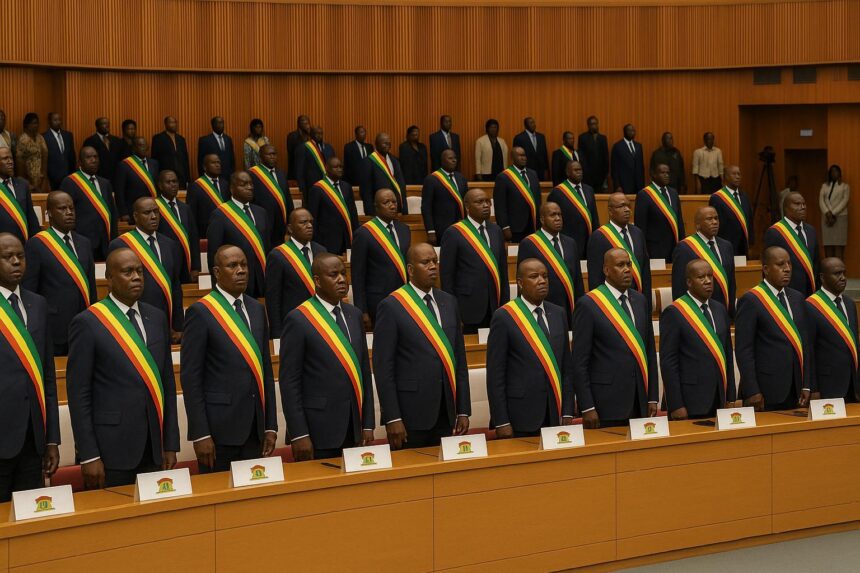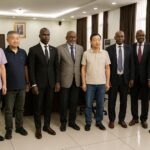Closing of Ninth Parliamentary Session
Speaker Isidore Mvouba’s final gavel in Brazzaville signaled the end of the National Assembly’s ninth ordinary session, a sitting framed by both ritual and urgency. Deputies, flanked by ministers and diplomats, applauded a term that balanced loyalty to the executive with a renewed appetite for scrutiny.
From the rostrum, Mvouba invoked a football metaphor, pledging to “mark the government at the waist” and urging colleagues to deepen checks on policy execution. The comment, delivered in a measured baritone, landed as a reminder that oversight, not confrontation, is the Assembly’s constitutional obligation.
The mood inside the hemicycle reflected the broader political climate: confident yet aware of fiscal headwinds. Congo’s economy is expected to grow by roughly 3.5 percent in 2025, according to the Ministry of Finance, but debt sustainability and public service delivery remain pressing issues.
Legislative Productivity and Domestic Governance
Thirty-two matters reached the chamber floor during the session, and deputies adopted twenty-seven of them, an approval rate that the Speaker described as ‘commendable efficiency’ (Journal de Brazza, 11 June 2025). Several bills originated from parliamentarians themselves, suggesting an incremental shift from purely executive-driven lawmaking.
Among notable measures was legislation establishing independent general hospitals in Sibiti and Ouesso. The health committee fast-tracked the texts after site inspections, citing demographic growth and limited tertiary facilities in Lékoumou and Sangha. Presidential inaugurations are expected shortly, reinforcing the head of state’s social agenda.
Lawmakers also amended the Public Procurement Code to widen local-content requirements, a move applauded by small-and-medium enterprises associations. While the executive supported the revision, analysts note that stricter oversight will be needed to translate clauses into transparent tender procedures and measurable gains for domestic suppliers.
Economic Reform Imperatives under CEMAC
Congo-Brazzaville’s reform calendar remains anchored to convergence criteria agreed with the Central African Economic and Monetary Community. The bloc urges members to cap deficits at 3 percent of GDP and contain public debt below 70 percent, thresholds the government says are attainable through prudent borrowing and diversified revenue.
An International Monetary Fund staff review in April projected gradual improvement, contingent on energy receipts and disciplined spending (IMF Country Report No. 23/45). Parliamentarians therefore framed their oversight pledge as complementary rather than antagonistic, positioning the Assembly as an ally in securing successive disbursements under the Extended Credit Facility.
Health Infrastructure as Social Capital
The hospital bills touched a sensitive chord. Life-expectancy gains recorded since 2010 have plateaued, partly due to uneven medical coverage, according to the World Bank. By converting regional clinics into fully-equipped reference centers, deputies argue they are operationalizing Article 36 of the Constitution, which enshrines health as a right.
Costing estimates remain confidential, yet unofficial figures hover around 80 million dollars for Sibiti and 95 million for Ouesso. Financing blends treasury resources with concessional loans from the African Development Bank, insiders confirmed. Parliamentary monitoring committees are expected to follow procurement, construction milestones, and eventual staffing patterns.
Tax Convention with Türkiye and Regional Diplomacy
Beyond domestic priorities, deputies authorized ratification of a bilateral tax convention with Türkiye, signed in Ankara last November. The accord eliminates double taxation on income, establishes information-exchange protocols, and provides mutual assistance in collection, measures intended to stimulate cross-border investment and prevent illicit capital flight.
Turkey’s direct investment stock in sub-Saharan Africa surpassed 6 billion dollars in 2024, according to Ankara’s Ministry of Trade. By offering legal certainty to investors in sectors such as construction, agribusiness, and logistics, Brazzaville aims to diversify partnerships beyond traditional European and Chinese interlocutors.
Diplomats interviewed in Brazzaville describe the convention as a ‘precision tool’ that aligns with the African Continental Free Trade Area’s broader tax harmonization agenda. They stress, however, that effective follow-up—through joint committees and prompt interpretation of clauses—will determine whether projected trade volumes materialize.
Prospects for Enhanced Parliamentary Scrutiny
Looking ahead, the Assembly expects to reconvene in October for the budget session, traditionally dominated by debates over oil-price assumptions and capital-expenditure envelopes. Preliminary drafts indicate increased allocations for digital infrastructure and climate resilience, areas where deputies pledge to interrogate implementation timelines and gender-responsive budgeting.
Mvouba, whose speakership is entering its eighth year, says he will rely on mixed committees combining majority and opposition members to audit sectoral ministries. ‘We are guardians of credibility,’ he told reporters, hinting at more frequent field hearings in departments as diverse as forestry, telecoms, and vocational training.
For observers, the ninth session’s legacy may rest on whether declared resolve translates into data-driven oversight that supports President Denis Sassou Nguesso’s reform roadmap while reassuring international partners of fiscal discipline. The coming months, therefore, will test the symbiosis between an assertive legislature and a results-oriented executive.
Civil society observers welcome the promise of transparency but urge digital publication of committee reports within statutory deadlines. Such disclosure, they argue, would elevate public trust and provide multilateral lenders with real-time metrics on policy execution, thereby reinforcing Congo’s standing in regional and global financial forums.






















